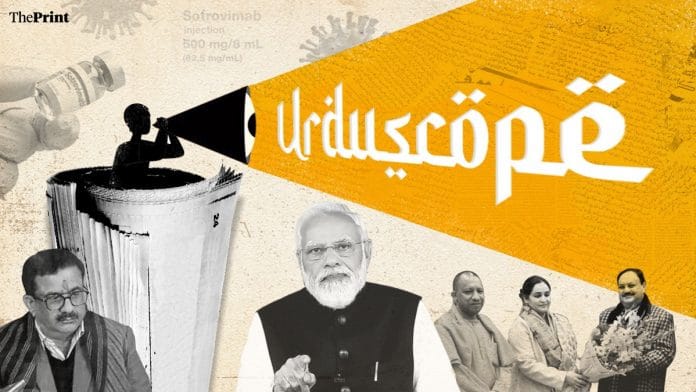New Delhi: The upcoming assembly elections in Uttar Pradesh and Punjab, in particular, are now increasingly prominent in Urdu newspapers, but the focus has not shifted from the “lack of police action” in the alleged Haridwar Dharam Sansad hate speeches case, and what the “worsening” environment for Muslims in the country. The Covid pandemic situation continues to be grim and was on the front pages almost every day of the week.
ThePrint brings you a roundup of what’s making headlines in the Urdu press this week and and the editorial stances taken by some prominent newspapers.
‘Hate speeches’ and the message to Muslims
Articles relating to the “lack of action” on alleged hate speeches delivered during the Haridwar Dharam Sansad remained top of the pages in Urdu newspapers for much of the week. In a front page editorial on 18 January, Inquilab claimed that ever since Narendra Modi assumed office as prime minister for a second time in 2019, Muslim organisations had not met the PM. It is important, the paper wrote in the piece titled ‘Milna zaroori hai’ (it is important to meet), in the face of continuous hate spewing, to meet him and ask him “what wrong the Muslim community has committed to deserve such treatment”.
The paper also carried, as its page one lead on 17 January, a report on former Army officers knocking the Supreme Court’s doors to seek intervention in the Haridwar hate speeches case. The petitioners reportedly described it as the first time since independence that such language has been used and termed the trend a threat to the welfare of the nation.
Along with that story was one about how Muslim girls in a government college in Karnataka’s Udupi district were being marked absent because they were wearing the hijab. Roznama Rashtriya Sahara carried a follow-up to the same story on its front page a day later.
Roznama’s 18 January editorial made the point that while it may be a long time before offenders like Jitendra Tyagi (formerly Waseem Rizvi, who has been arrested for making alleged hate speeches at the Haridwar Dharam Sansad) face legal action — pending their guilt being proven in court — hate speeches tarnish the country’s image. A day later, its lead story quoted Muslim intellectuals asking the Prime Minister what message he wants to give to the Muslims of India and the world with his “silence” on the hate speeches against them.
Medicines for Covid
On 15 January, Siasat led with the WHO recommendation of two new medicines for Covid treatment — Baricitinib for severe disease and Sotrovimab for non-severe disease (the latter pending more data on efficacy against the Omicron variant). On 21 January, Roznama carried the news of Delhi’s 43 Covid deaths in 24 hours as the page one lead. A day earlier, it had also carried on the front page news about the Supreme Court’s unhappiness with the way states had handled the issue of compensation for families of people who had lost their lives to Covid.
Roznama, in an editorial on 19 January, argued in favour of schools reopening with Covid protocols in place, so that children can resume their education. The alternative, the paper said would be a “generation drowned in ignorance”.
The Centre’s affidavit in the Supreme Court that the Covid vaccine cannot be administered by force was carried on the front pages of both Siasat and Roznama.
Also read: Five reasons why ministers are leaving Yogi Adityanath govt right before UP elections
Poll battle in Uttar Pradesh
As is expected over the next few weeks, political developments in Uttar Pradesh made front page headlines of most Urdu newspapers. On 20 January, Inquilab and Siasat led with the news of the induction of Samajwadi Party patriarch Mulayam Singh Yadav’s step-daughter-in-law Aparna Yadav into the BJP. Siasat also carried on the front page the news about BJP finalising its electoral alliance in Uttar Pradesh with Apna Dal and Nishad Party.
Days before this, in an editorial on 15 January, Siasat wrote that Uttar Pradesh has reversed the usual pre-election trend of leaders from various parties joining the BJP. Instead, the BJP was the one losing MLAs in UP and that is what seems to have propelled Chief Minister Yogi Adityanath, “who thinks of himself as the best”, to share a meal in a Dalit household.
In an editorial on 20 January, Siasat wrote that the BJP is facing an uphill battle not just in Uttar Pradesh, but also in Uttarakhand, and this has been confirmed by its internal surveys. It termed the situation in the hill state a “test of patience” for the BJP. The deferment of elections in Punjab following appeals from several parties was carried on the front page of all three newspapers on 18 January.
Clubhouse and Muslim women
The notice issued by the Delhi Commission for Women to the Delhi Police on its alleged lack of action for derogatory remarks against Muslim women in a chat on the ‘Clubhouse’ app was carried on the fronts page of both Inquilab and Siasat on 19 Janauary. Inquilab wrote that DCW chief Swati Maliwal had taken up the matter and urged the police to lodge an FIR, after there were “massive protests” on social media.
Modi speech to WEF
Prime Minister Narendra Modi’s virtual World Economic Forum address was on the front pages of all newspapers on 18 January. While Inquilab and Roznama headlines talked about his invitation to investors, Siasat highlighted the emphasis on international collaboration to resolve issues such as cryptocurrency.
A day later, Inquilab also carried on page one Congress leader Rahul Gandhi’s sarcastic statement that the PM had “lied so much that even the teleprompter could not bear it”. The reference was to an unscheduled break in the PM’s speech, which was incorrectly attributed to a teleprompter glitch.
(Edited by Poulomi Banerjee)
Also read: Modi can’t speak? Tech glitch during WEF speech triggers bogey of ‘teleprompter PM’






